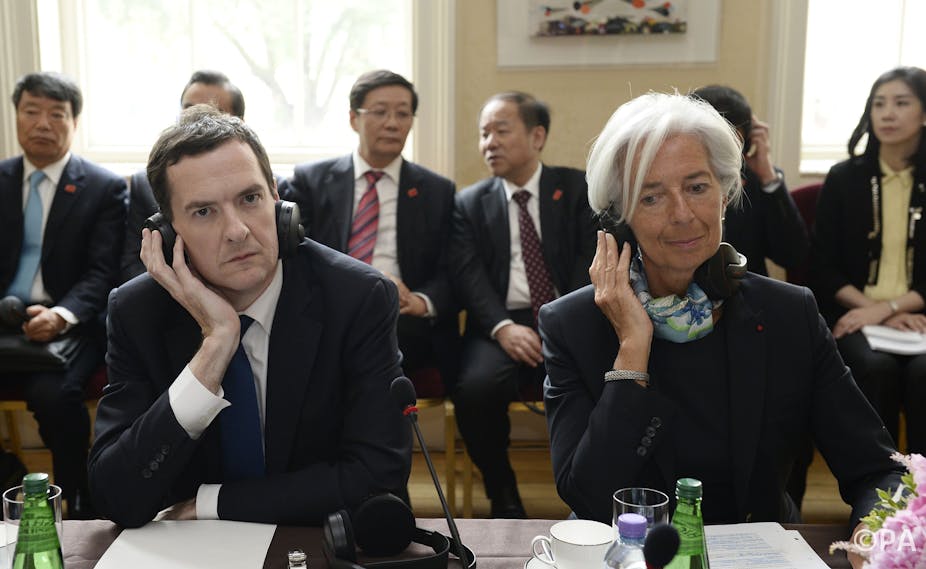There are mixed messages from the International Monetary Fund. The UK gets a pat on the back for its recovery, but the fund warns of darker clouds ahead in its latest World Economic Outlook.
Overall, the view is that in the foreseeable future the western world is unlikely to return to the pre-crisis era of economic growth. A major reason for this is the shrinking purchasing power of ordinary people due to wage freezes and a largely low-wage economy, though this receives little attention from the IMF.
But the IMF failed to address the banking sector, which remains the Achilles heel of the world economy. Politicians tell us that far-reaching reforms are being implemented. But scratch the surface and you see the pre-crash practices being repackaged.
Bank stress tests are a case in point. These are supposed to test a bank’s ability to withstand adverse developments. The key idea is to ensure that banks will have adequate capital to manage financial shocks such as erosion of credit, liquidity, changes in markets and lines of credit. The tests look at the quality of a bank’s assets and loans.
In general, a dynamic balance sheet mimics the “what-if” scenarios to ascertain how a bank can manage adverse developments. Of course, many of the risks are in the system where troubles for one bank can have a knock-on effect on others and bring down the whole thing.
Before the 2007-2008 banking crash, stress tests were mostly carried out by the banks themselves rather than by external regulators. Typically the models for stress tests used ratings provided by credit rating agencies and hired the Big Four accountancy firms to do the number crunching.
We all know the consequences. Credit ratings confidently gave AAA ratings where they weren’t due, many turning out to be worthless. The industry is mired by conflicts of interests as it has a close business relationship with banks.
Despite their knowledge of stress tests and risks at banks, the Big Four accountancy firms gave a clean bill of health to almost all distressed banks, with some collapsing within days of receiving a clean bill of health. The firms collected large amounts in audit and consultancy fees. The firms were effectively auditing and reporting on the outcomes of the stress tests they themselves had carried out.
Following the 2007-2008 crash, central banks, such as the European Central Bank and the Bank of England assumed responsibility for bank stress tests. But they continue to rely on credit ratings developed by the agencies, whose success is judged by private profits rather than any service to the state or people.
And, the regulators have hired Big Four accounting firms to do the calculations. Spending €500m on stress tests, this work from the ECB is a boon to consultants and accountancy firms in particular.
Lessons, what lessons?
Hardly any lessons have been learnt from the folly of relying on these accountancy firms. PricewaterhouseCoopers (PwC) is under scrutiny for the £250m accounting hole at Tesco. The firm also audited Bank of America which has been fined for overstating its capital by about US$4 billion.
At the height of the crisis, some US$5,000 billion of assets and liabilities went missing from bank balance sheets audited by the Big Four firms. Their gravy train rolls on, even though the firms are unable to serve the interests of regulators.
Recent examples include PwC receiving a US$25m fine from New York’s financial regulator for sanitising its report to regulators regarding sanctions and anti-money laundering compliance at Bank of Tokyo Mitsubishi. In 2013 Deloitte was fined US$10m for “misconduct, violations of law, and lack of autonomy during its consulting work at Standard Chartered on anti-money laundering issues”. But the Big Four continue to be trusted with auditing banks for the public good and not their own profits.
Following the banking crash the regulatory deckchairs were rearranged; but little has changed. Despite their failures, regulators continue to rely on credit rating agencies and accountancy firms.
This reliance on external advisers means that the regulators have failed to develop an adequate in-house knowledge base and are in a poor position to manage the risks of bank behaviour. Let’s hope it doesn’t take another crash of the financial market to encourage the IMF and the regulators to reflect on institutional failures in the banking system that is at the heart of the global economy.

